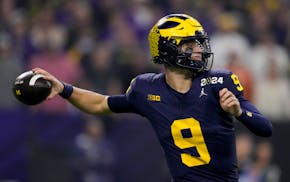Jay Pivec was an ambitious young basketball coach, so he emulated the greats. That's why there are photos of him wearing Sansabelt slacks and collars the size of seagulls.
"How many polyesters," he asked, perusing a basketball program featuring photos of coaching legends, "had to die to make these suits?"
Pivec, the former MCTC head coach and current assistant at second-ranked St. Thomas, recently returned from his annual trip to Las Vegas, where he visited the UNLV basketball team. He was in attendance at the Thomas & Mack Center when the PA announcer asked everyone to pay their respects to legendary UNLV coach Jerry Tarkanian, who had been rushed to the hospital.
"I had heard that it didn't look good," Pivec said. "We all rise to our feet, and I'm thinking, 'What do you do here? Do you have a moment of silence for someone who is still alive?' Then they said, 'Let's have Tark the Shark hear us from the hospital, let's give him a round of applause,' and the place went nuts.
"I got up the next morning in Vegas, turned on the TV, and Tark had died."
While Pivec mourned the death of another coaching legend, Dean Smith, he felt a particular kinship with Tarkanian, who died Wednesday.
In his days at the nationally renowned MCTC program, Pivec was the Tark of Loring Park. Like Tarkanian, Pivec recruited underprivileged and sometimes troubled athletes and employed them in a fast, aggressive style.
Friday, Pivec held a program in his hand from September 1978. The Medalist Midwest Coaching Clinic was held at the Radisson South in Minneapolis. The program features John Wooden wearing some kind of houndstooth pants, and Abe Lemon looking like the Rodney Dangerfield of coaches, which is exactly what he was. What is clear is that basketball coaches of that era did not waste much time contemplating fashion choices each morning.
"I wore Sansabelt pants — with sneakers!" Pivec said.
The deaths of Smith and Tarkanian had Pivec reflecting on a hard-to-fathom era of American sports. ESPN had yet to popularize college basketball as a national sport. Nike, not to mention Duke, had yet to rise to power. College basketball was a regional sport featuring a few godlike figures such as Wooden, Knight, Smith and Al McGuire.
"I'm saddened," Pivec said. "My three guys were Dean, Tark and McGuire. They weren't mentors. They were idols. I idolized everything they did. I wanted to be a non-playing guy who was going to be the next one of them.
"When I started coaching, the only way you learned was by going to these clinics. There was no Internet. You couldn't look things up online. You went and listened and took notes, and you hoped that at the hot-dog-and-beer social one of these guys would sit at your table."
Smith taught his famous four-corners offense. Tarkanian taught his "Amoeba" system, which featured long, fast athletes creating havoc all over the court.
Tarkanian became known as much for his feud with the NCAA as his coaching. He once said, "The NCAA is so mad at Kentucky they're going to give Cleveland State another year of probation." He fought the law, and the law didn't win. Tarkanian did.
"This was way before ESPN made it all such a big deal," Pivec said. "March Madness wasn't mad at that time. College basketball was about coaches, and die-hard local fans. So these coaches were accessible. They'd put on clinics, and every aspiring coach would show up wearing the same outfit. If you were really lucky you'd have a funky plaid jacket. Then you were hip."
Coaches paid the $30 fee for clinics and booked $24 rooms and inhaled basketball until their lungs filled. Pivec wouldn't miss a clinic, and neither would Flip Saunders, who made his way coaching in the CBA before landing a job with the Timberwolves.
"Going to those clinics, listening to these coaches, that was a golden time in my life," Pivec said. "There was nobody quite like the Shark."
Jim Souhan's podcast can be heard at souhanunfiltered.com. Twitter: @SouhanStrib. • jsouhan@startribune.com

Souhan: In 7 possessions, Wolves' defense reaches new level

Souhan: Wolves fans made Game 1 special. Now bring on Game 2.

Souhan: Should Vikings even consider McCarthy in NFL draft?

Souhan: NAW erases Suns' lead, Game 1 advantage with big performance


